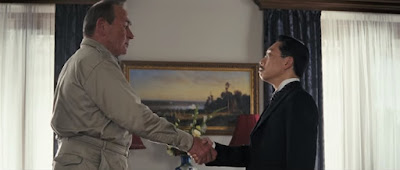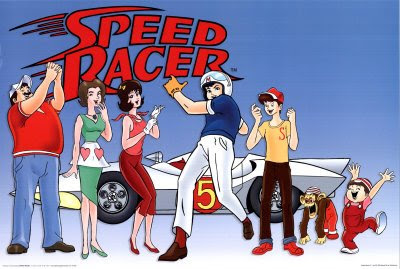Vantage Point (Pete Travis, 2008) An American news crew sits in their van in Salamanca, Spain, technically coordinating coverage of a Presidential visit. No sooner does POTUS (William Hurt) take the podium when two shots ring out, sending him flying, to the horror of the news-people, the Secret Service, the crowded throng and the millions who are (probably not) watching at home. For a split-second, there is reaction all around, and then the confusion starts: where did the shots come from, who's that running guy, get the president to the hospital, foot-chase. At the end of it, a lot of people are dead, and the ramifications are huge, while the news channels try to play catch up...and one suspects never will.
This one's just plain crazy. The same 15 minutes, played out, rewound, clock started again, and POV switched. Technically, it's a daunting challenge, with all the shots of things that have gone before shifted into the background, and having to match what went before in the same time-frame that it did before, although one later incident seems to be fudged a little longer to allow some exposition in one segment (all the better to build suspense). The director, Pete Travis, mostly known for his British television work) does one thing that always drives me nuts in pot-boiler novels—he takes you to one pop-eye inducing moment...and then...stops and goes back. Next chapter. We'll get back to that...That would make it "a relentless page-turner" if it had a spine, but you're stuck watching the movie, wondering, "Yeah, but what about..." Annoying. But, not enough to make you hit the "Eject" button.
Source Code did this a little better this year, and had the decency to make all the populace in it more than innocent by-standers. Most of the characters are there to serve a function in the plot, rather then being motivated, save for Dennis Quaid's Secret Service agent, who has just come back to active duty after taking a bullet for this President six months earlier. The speculation is that he might be a little gun-shy (if so, he wouldn't be put on active duty, now would he?)
Source Code did this a little better this year, and had the decency to make all the populace in it more than innocent by-standers. Most of the characters are there to serve a function in the plot, rather then being motivated, save for Dennis Quaid's Secret Service agent, who has just come back to active duty after taking a bullet for this President six months earlier. The speculation is that he might be a little gun-shy (if so, he wouldn't be put on active duty, now would he?)
This is the problem with the film. Good concept (even if it is Akira Kurosawa's), but the deeper we go into the movie and the more we find out about this 15 minutes, the situation becomes less and less likely, and more and more contrived. It has the kinetic feel of an episode of "24" compressed and spread out over a ninety minute running time. And, it isn't even "The Rashomon Effect," where (when it's done well) the differing perspectives are colored by the person telling the story. Here, facts are facts—it just happens from different angles, how the person feels about it doesn't enter into things. In that regard, Vantage Point is just a standard detective thriller, more about information dissemination in an electronic 24 hour news cycle, rather than saying anything about the human condition—besides the obvious jumping to conclusions. The film begins and ends in that van and the broadcast of events, making the point that there's a photon-filter between truth and knowledge. At the end, the news audience does not know, and may never know exactly what went down. But, given what we already know about the efficacy of reporting "while it happens," the endless speculation and rumor-airing and other apocrypha and opinion that's offered as journalism, it is a bit of a hollow exercise, a "gimmick" movie without that much to offer.
Is it a good movie? I don't know.





















